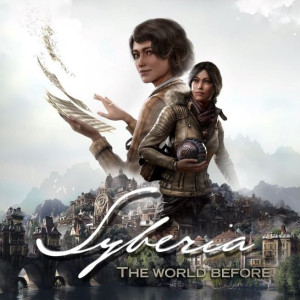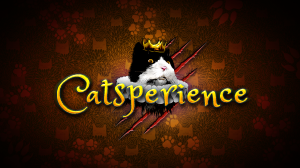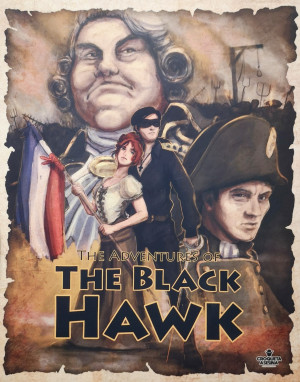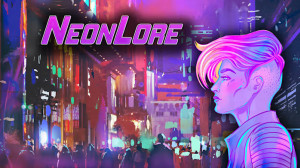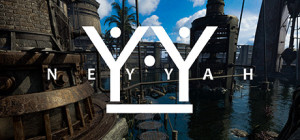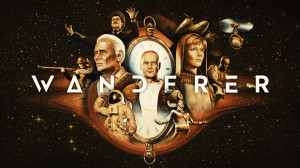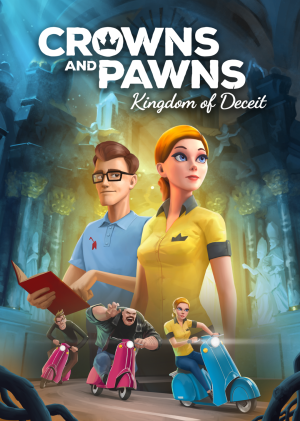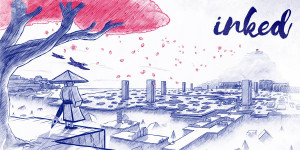Lucas Lagravette - Syberia: The World Before interview
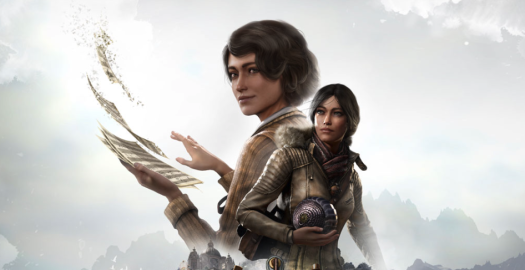
We're excited to have the opportunity to chat with Lucas Lagravette, director and lead writer of Syberia: The World Before, as the game recently released its lavish Collector’s Edition. After reviewing the game when it was first released back in March, we're curious to learn more about the creative process behind its development, plus Lucas' experiences in the industry, and what he hopes players will get out of the game.
What is the story behind Syberia: The World Before?
Syberia: The World Before is the fourth release in the Syberia series, created in 2002 by the famous comic book author Benoît Sokal. We started work on it in 2017, the day after the release of the third episode. That production was very complicated and we were not entirely satisfied with the result. With Benoît Sokal and the core team at the time, we set two goals. The first one, and the more realistic of the two, was to do better than the third episode. The second, more idealistic, was to reach the quality of the very first episode - which is unanimously recognized as the best. We are honored to see in feedback from players and press alike that both goals have been met.
How does the game tie into the larger Syberia universe?
Scenario-wise, it is a direct sequel to the third episode. However, we wanted it to be playable and understandable by as many people as possible. So it's an independent story overall, but with many winks and references for longtime fans of the saga. This episode also works as a kind of spiritual prequel - in the sense that it focuses more on the great History of this alternate timeline, especially the Second World War and, by extension, the origins of this whole story. It also has a more psychological dimension, with a particular focus on developing the inner journey of Syberia’s main character, Kate Walker, whom I personally loved in the first episode.
In terms of gameplay, we wanted to freshen it up without betraying the legacy of the saga. We devoted a lot of attention and care to capturing the historical gameplay markers of the license: the "point 'n click", the scripted cameras magnifying and dramatizing the environments, and the puzzles, to name a few. But by modernizing their delivery and by giving them all the advantages of modern narrative games in full 3D, we were able to create two fully functional control schemes: One where you use a controller to move the character directly, and another using only the mouse - thus realizing our intention to make the game fully playable with one hand, just like the original episodes.
What new gameplay mechanics and features could players expect in Syberia: The World Before?
First of all, there are the puzzles. This time you are directly and fully in control of their interactive parts: you have to reproduce with your joystick or your mouse the gestures of the character in order to activate their various pieces. Our goal here is to give you a sense of control and immersion, a more organic connection to these wonderful mechanisms that you are regularly asked to activate or repair over the course of the story.
We then introduce a brand new playable character in this episode: Dana Roze, who appears in sequences set mostly in the late 1930s. Most of the time you alternate between Kate and Dana as the story requires. But in specific sequences you have to overcome an obstacle by switching freely between the two characters - and therefore, between the two eras. We use this free switching with other characters, but I don't want to spoil anything more than that. We also included some very specific playable sequences that have never been seen in the series before, and we are particularly proud of those.
How did you approach designing puzzles and challenges for a new generation of players?
Very early on, we decided to create extremely immersive puzzles which wouldn’t leave players stumped for hours on end, as can be the case historically with point 'n click adventures. The old way is a legitimate approach, but in our case it would have hindered an experience that we wanted to be "story driven". We sought a balance where the narrative would not erase the puzzles, but rather would merge with them. This is achieved through small details, such as conversations between characters that take place during the puzzle phases, and the fact that each puzzle is justified by the story, logically placed, and never pointless. We also worked to ensure that the puzzles didn’t disrupt the pacing, and the rhythm of the player's progression through the story.
We wanted to offer an experience that would be accessible to everyone, whether you are a longtime Syberia player or venturing into the world for the first time. We took great care in creating a progressive clue system - here, too, with a strong storyline justification, as the hint system is entirely diegetic (meaning it exists within the world).
Hitting the right balance between pacing, challenge, and approachability, and sustaining that balance inside an immersive and logically arranged world, is an obsession for the designers on our team. With our next productions, we aim to push all of this thinking further. In particular, we’d like to give players more control over their experience. If you’re someone who wants to have a more “hardcore” game that stays true to the spirit of classic point ‘n click adventures by offering zero tips, you’ll be able to do that. And on the flipside, those who wish to have a more immersive experience that is driven primarily by the narrative - they’ll have that option.
What was the development process like for Syberia: The World Before?
There was a real paradox in the making of this game. It was a long and complicated production, because we started from scratch, unlike the third episode. Even though we used the same engine, we used it in a totally different way. So we had, I guess, all the concerns inherent to a new team (which recently became Microids Studio Paris) working on their first game. And yet, despite the inevitable cuts, iterations, and rewrites, the "core story" and the intentions that we had laid out in the first year of development are present in the final game, and they hit surprisingly close to that original vision. We could say that we identified the destination very quickly, but that the journey was longer and more complicated than expected - as is often the case in video game creation!
What is your favorite or most memorable moment during the development of Syberia: The World Before?
There were so many... It's hard for me to choose. I'll go to two extremes. There was the whole period of writing the first draft of the story and defining the main game mechanics. I remember it as a golden period of enthusiasm and creative collaboration, of having the collective feeling that, despite the concrete difficulties, the initial promise that we were defining for this project had something different and exciting going on.
Then, in a more diffuse way, I have excellent memories of the team collectively resolving very concrete production problems. Meetings between game and level designers to improve levels and trying to take the best of everyone’s ideas, exciting exchanges with all the people involved on cutscenes, audio… that sort of thing. And then to see that it all worked - often even better than I thought - is incredibly gratifying.
When I look back, I feel terribly lucky and honored to have worked with so many talented people on this project, whether they are still on the team today or have moved on to new horizons.
What was the biggest challenge you faced during development?
Again, the list is quite long... However, I would say that it is the end of production, about a year before its release on PC (March 2022). On the one hand, we had a brilliant and fully operational team, processes that were finally working, and a realistic deadline - thanks in part to the release delay granted by the publisher, whom I can't thank enough. But on the other hand, we still had so much to do to release a good title. So with Benoît Sokal, we proceeded with a last big rewrite of the game to be sure that all the content would be fit for the release, and within the quality criteria we had set with the publisher. I'm very proud of the work that was done - and I'm not just talking about the rewrite, but also the way the team - from the studio to the publisher - brilliantly absorbed it and made it happen. So much so that, I can say in retrospect, that it didn't detract from the game, but enhanced it, making it more edgy in its conclusion and removing some of the last remaining excess.
However, behind the scenes, this extremely busy period of production was also very busy on a personal level. On the one hand, the happiness of welcoming my first child. And on the other, the announcement of Benoît Sokal's illness. I would like to pay him a heartfelt tribute. He was... heroic, during this whole period. He did a colossal amount of work, coming up with brilliant new ideas, and staying as present as he possibly could. Until the end, on May 28, 2021.
For that, and for everything else, thank you Benoît. I hope that wherever you are today, you are as proud of the final result as you were of the Alpha version of the game that touched you so much during that period.
How do you feel about the final product?
Proud, precisely. And less and less anxious... For months, I think that the inevitable imposter syndrome that everyone feels when releasing a project of this magnitude made me fearful of last minute problems: some bug or forgotten defect that we missed. With time, I see less of the inevitable yet ultimately minor imperfections that still remain. Watching people stream the game (and enjoying it a lot) has helped me a lot with getting me to take a step back.
What do you think about the game's reception?
Again, I was afraid for months that this incredibly positive critical reception would turn out to be some kind of big misunderstanding. Don't get me wrong, I think we've released a good game, very much in line with our initial intentions. But 92% favorable reviews on Steam... Top marks on AdventureGamers... Unanimously favorable reception from the press... It just seemed incredible. And the fact that this positive reception continues with the console versions continues to amaze me to this day.
What are your plans for the future of the Syberia franchise?
I don't really have any concrete announcement to make... I can tell you that Benoît Sokal has left us some elements to work with, if a sequel should be made. We are very keen as a team to embark on this new adventure, but at this stage the decision is not up to us.
What is your favorite thing about the Syberia games?
The creative freedom the universe allows, with particular emphasis on its approach to the fantasy genre. We can do quite advanced character development while revisiting the history of the 20th century, make gameplay based on incredible and sometimes wonderfully absurd mechanisms, introduce mythical creatures, go from laughs to tears. My personal pet peeve remains writing and designing moments focused on the relationship, which lives somewhere between deep friendship and hilarious mutual misunderstanding, connecting Kate and a certain character who is well known to fans of the series…
What do you think sets the Syberia games apart from other adventure games?
Without hesitation, it’s the signature of its creator, Benoît Sokal. The rules he set, the universe and the aesthetics he created, the characters… It is a true creative monument to Benoît’s unique vision, and one which he very much took to heart in his work with the team on The World Before.
Syberia: The World Before has launched on PlayStation and Xbox; of all platforms, which do you believe is best suited for adventure games and why?
From a historical point of view, the obvious answer seems to be the PC... However, I’m of course very interested in efforts to make the genre "console friendly." I hope Syberia: The World Before contributes to that body of work in its own modest way, particularly with controls that are tailored to enhance the console and PC experiences, both. The question of accessibility in the broadest sense of the word is a fascinating subject, and I'm glad that it is becoming more and more important in the news and conversations we have about how games are made.
In the specific case of adventure games, it seems to me that the important thing is not the way you play them - although I appreciate the possibility of being able to finish some games with the mouse alone. It's more about a certain connection to rhythm, to the balance between gameplay and narrative, and to some sort of deal between creators and players... A deal where the challenge lies in the player’s ability to understand the logic of the game world, and not in the pure "skill" of mastering the mechanics.
What are your thoughts on the current state of the adventure game genre?
We are at an exciting crossroad. I have the impression that the adventure game has historically been a great canvas for "middle-of-the-road" games, i.e. titles with an "AA" budget, in between blockbuster and indie. In this space, the conventions of the genre allowed for very ambitious narrative and/or aesthetic elements, but there was less space for investment in pure system development (which is why so many classics are built around exploration, inventory-based puzzles, and earning the “reward” of a CGI cutscene).
Now, especially since the demise of Telltale Games, I have the feeling that the genre is divided between resolutely retro experiences that aim to please hardcore fans (for example Ron Gilbert's games), pure indie experiences like Sam Barlow's works, and big budget interactive dramas from studios like Quantic Dream or Supermassive Games. Then there are titles like Syberia - or some of DON'T NOD's games - that try to squeeze in between these trends.
If we add up all the examples I've given here, it's not impossible to imagine that the adventure game genre - or at least its legacy - is particularly well established. Let's hope it lasts!
What's next for you? Do you have any projects in the pipeline you can tell us about?
All I can say at this point is that we are working on a new project at Microids Studio Paris, with a majority of the World Before team. It's a smaller project, but an ambitious one. If it is greenlit, you should hear about it in the upcoming months... And my little finger tells me that this is an announcement that will make AdventureGamers readers very happy!
Any final callouts to the readers of AdventureGamers.com?
When participating in the creation of a game, I always have an "ideal player" in mind, a sort of mythical figure, the judge I seek to convince based on the choices and directions I helped to define. Veteran Syberia fans and adventure game enthusiasts, who I imagine to be the typical reader, and perhaps even editor, of AdventureGamers, represented that ideal gamer for me in the case of The World Before. So when I found out that the site had given us the highest rating... I was just like... Wow, we did it - we released this good game that we've been aiming to create for the last five years... So, thank you, readers and editors, for the wonderful feedback. I can't wait to introduce you to the next one!




